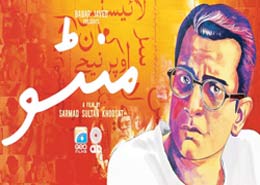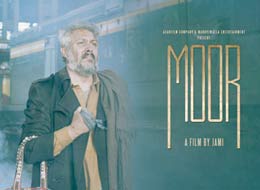Impressions of a cinema-goer:
Part II
I know I’m late. Life got in the way of this sequel to my earlier write-up. There were times I thought about just doing away with this one, but then I got carried away by the response on the last one and immersed my head in my laptop. So, the fact may be that almost all these films are out of the cinemas and no more playing, but then cinemas only cater to a minority of the population - and you’d still need a scale to veer through these films while watching them later on. Also, this is how I pay for my cinema tickets. Well, with the astounding speed of light this magazine pays me, it rather is paying for my future kids’ tickets - but hey, I’m not complaining! On a serious note, though, these films came out to be infinitely better than those in the last part; so here’s an official shout-out to all these - just in case my dispassionate take on these leads you to believe otherwise!
Manto
The film Manto is about the legendary Urdu writer, Saadat Hassan Manto. For the record, he’s not the same person as Lord Minto that we read about in our Pakistan Studies books. The film is about the last seven years of the writer’s troubled life, but we shouldn’t bother as all this happened long before we were born and they could have passed these as his first seven years for all we know.
Sarmad Khoosat is the star of the show here. Not only has he nurtured the film with his immaculate direction, but also plays the titular character perfectly to boot. It’s high-time we should start addressing him as someone else besides the director of Humsafar. All the famous short-stories of Manto (which most of us have never read because, at first, we were too young for them, and then grew up to be too cool for the same) have been mingled flawlessly with the writer’s personal life. Crisp, engaging and inspiring, this is a movie to (illegally) download on torrents and keep with you. For those not interested in Manto’s literary aspirations and his heavy words, there’s enough on the side to keep you seated till the end. Glam-sham, kothas and dancing girls (recurring topic in Manto’s stories) grace the screen for ample time.
While we have a tendency to adulterate everything with vulgarity that we think would be funny, entertaining or titillating (and ends up being plain irritating), full marks to Sarmad Khoosat and Shahid Nadeem for even keeping the sleaze away where it could have been appropriately justified. The adaptation of the controversial Thanda Gosht is a defining moment for art in cinema - ask me to do this, and there’s no way I could even think of working about it without it being tagged as ‘very, very adult only’ content.
All the supporting cast, which includes basically everyone from the Pakistani showbiz industry, fit in the narration like a stack of spoons. I hear Nandita Das is also in the process of making a biopic on Manto, but if I were Nandita Das, or even Steven Spielberg for that matter, I would make a flying excuse about not garnering enough finances or losing interest in the project - just to keep myself away from competition with this one!
Moor
Moor (or ‘mother’ in Pashto) was a film that shook even the ‘snarliest’ most of Pakistani critics and they groaned in unison: ‘We finally have a complete Pakistani film!’ Making ample use of thesaurus and sprinkling all the synonyms for super they could find, it was met with enormous response. The downside, though, was that it wasn’t a commercial success and people kept on preferring any moving foreign thing that the cinema would be playing but not this one. Also, despite being based on Baluchistan and featuring a Pashto speaking family, the film wasn’t screened in a single cinema of the province - apparently, because there isn’t a single cinema in the province - or in the Pashto speaking Khyber-Pakhtunkhwa - despite there being a single cinema in the province.
Intense, sensitive and engrossing, Moor is strictly for the serious cinema aficionados; not even a hint of an item number, ouch! Based on NLC (don’t worry if you don’t know what this is - neither did I before my mother told me) and its subsequent effects leading to the destruction of the Pakistan Railways, the story packs a punch. The acting is good, the direction crisp, but it’s the trodden, dry and snowy beauty of Baluchistan that forms the gist of the story. If nothing else, the movie has mapped Baluchistan in our national conscience, and that’s no mean task. There often are the Nolan moments, Jami apparently being a big fan, and the story-line gets a little complicated if you’re playing Candy Crush while watching the film. The music by Strings is spectacular, every song is a winner; and perhaps is also the reason the recent season of Coke Studio came out to be something of a dud - since the band had given all it had to this wonderful soundtrack.
Moor unfolds with a moral compass, it being a little too strong in some instances; and it’s the women of Moor that act as the beacons of hope and guidance. Samiya Mumtaz, despite being dead from the start, plays a very impactful character, even as her hair get to be longer than her screen-time. There’s a particular sequence in Moor, where the lead characters abruptly stop while walking along the tracks of the railways. As the camera pans from above, we’re shown the reason: a piece of the tracks is missing, disconnecting the sides with a considerable gap. This subtle take on corruption and its consequences is what makes Moor some super cinema! And while the Pakistan Railways could have easily used Moor as its promotional mouth-piece, they continued to be the myopic smugs that they are and didn’t offer the producers any assistance; not to talk of pennies!
Jawani Phir Nahi Ani
Jawani Phir Nahi Ani is about the only film in recent history of Pakistani cinema that came out on YouTube as soon as it did in cinemas. Popularly known as the film regarding which Hamza Ali Abbasi put his foot in his mouth (about ten times), this one also exceeds expectations - just as long as you’re clear about what you’re expecting. It’s a laughter-riot, to put it simply. Borrowing from Vidya Balan (and not proudly so), it’s entertainment, entertainment, entertainment!
Hamza Ali Abbasi does all the things he warned us he had, and also repented so eagerly - flirting with women, dancing and posing around with bikini-clad ones, etcetera. But his Facebook statuses glorified his role a lot more than what it actually is. The ensemble cast puts up a great show together. The recipe of the story is basically the amalgamation of a lot of ingredients from Bollywood and Hollywood, only that they are sprinkled with the masala of desi humour and topped with a dressing of Pakistani pop-culture - and voila! You get a fine entertainer.
The songs of the movie are very forgettable and come in a lot more than anyone would like - they actually make you want to demand cinemas where you can forward stuff. The dialogue is super, super funny. I don’t remember having this amount of laughter pangs in any movie recently. It borrows heavily from tried-and-tested humour, but just as you’re anticipating the movie to take the same dive (and break its skull), it turns to the right and leaves you in for a surprise. For one, and I might not say this ever again, even drunk jokes are funny. The Wrong Number girl (I’m still haunted by memories of that one) cracks you up with her obsession with selfies and hashtags. That’s the best thing about this one, it’s culturally, socially, even politically relevant. At times, it even dwells at the helm of being a social commentary. Bushra Ansari, Ismail Tara and Javed Sheikh (who I believe has sworn on his head to be a part of every film made under the skies of Pakistan, ever) do the comic timing really well, which is not to say the uncountable wives and husbands of the movie (too many to list here) don’t. I know people who watch Punjabi stage-shows to tune up their sense of humour every now and then, they can just as well use this film for the purpose!